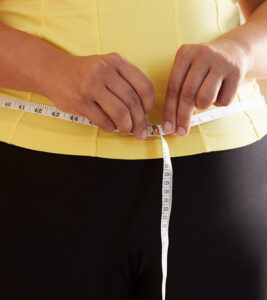
How to Beat Weight Gain During That “Time of the Month”?
It may seem that when “that time of the month” is coming around that you start dreading a lot of things.
The awful cramps. The BLOAT.
One of the most common issues is wondering how much weight gain is going to take place this time?
While it may seem that you really pack on the pounds, it isn’t as much as you think.
Yes, there is great discomfort that comes from a bloating feeling, but it doesn’t mean that you are putting on ten pounds.
It might feel like it, but you really aren’t.

The truth is that there is only a difference of about 2-4 pounds. Even up to 5 lbs, I’ve found.
Where does the bloating come from?
There are misconceptions about where this PMS weight gain stems from before menstruation. Many believe that it comes from overeating.
After all, you do eat more during PMS.
Because we all know we get the munchies during this time.
The truth behind this is that while there is more eating going on, there is also an increase in metabolism that is just enough to offset the difference.
There might be a slight increase, but not enough to be noticeable.
Another misconception is that it comes from eating more sweets.
The fact is you are craving more sweets during pre-menstruation. It isn’t clear why that is the case, but it’s obvious that it exists and that craving increases as the symptoms of premenstrual syndrome worsen.
While you might think that this would cause a lot of weight to come, you aren’t eating enough of an increase in calories to cause very much of on increase in weight.
Can meat affect your cycle?
Eating processed foods and meat-especially red meat, does increase bloating and gaseous abdominal discomfort.
Even though I’m already gluten-free, soy-free and all-natural with my meat, avoiding red meat and pork, 99% of the time.
I started eliminating all-meat and any processed foods during my cycle and it has resolved 95% of my bloating and cramping discomfort.
It’s shocking really.
You would be amazed on how much better you’ll feel, If you go vegetarian, 1-2 days before your period and continue through days 1-2.
Its change is mind boggling, but meat, gluten and soy really do intensify symptoms and irritate your reproductive system.
Also try eliminating dairy from your diet leading up to and while on your period.
Animal milk is something that should be avoided at all costs and at all times. But especially during menstruation.

Dairy as a whole, sends the body into a state of inflammation with increased mucus production as well. Increased inflammation in the body only increases menstruation symptoms. Our current dairy sources, contain many hormones and steroids due to what’s given to the animals that milk is pumped from.
A health change that should be incorporated into your lifestyle is eliminating cow’s milk with almond milk.
Yes, its said that almond milk may contain cyanide, just like arsenic in rice. Although the health problems that come from cows milk far outweigh any type of unhealthy possibilities that almond milk may contain.
Another way to resolve seasonal allergies would be to eliminate dairy. Dairy is the key to all inflammation and most allergies in the body.
I myself have suffered from seasonal allergies since I was a teenager and once I started eliminating cow’s milk and dairy I noticed an immediate difference and my sinuses and nasal congestion. I woke up each morning feeling clear immediately.
Yes, I do have gluten free pizza at times that contains real cheese and never fail upon waking the next morning I have this nasal congestion that I know came from the cheese that I consumed the night before.
FYI- I have tried multiple forms of vegan cheese… And it just doesn’t cut it… I’m such a texture person and the texture of artificial cheese doesn’t hit the mark.
So yes, I’d rather have real cheese on occasion and enjoy my pizza the way it ought to taste. And some gluten-free pizza crusts taste surprisingly good. Check out my favorite brand so far it’s Freschetta…so good.
So, Give it a try.
Eliminate all meats and dairy from your diet before & during your period.
What do you have to lose?
Just cycle pain… and THE BLOAT.
How much is water retention?
The weight that you do put on happens to mainly come from water retention.
For those who are struggling to control their weight, this is super frustrating. It seems that no matter how much work you normally do or how good your diet it, you seem to still put on weight and feel bloated.
Don’t worry, though. The water that is retained usually all comes off during menstruation. As long as your diet choices are right too.
There is a few of things that you can do to help limit the amount of water you retain.
1) Limit the amount of sodium you take in.
2) Avoid all meat and processed foods- foods in a box or package
2) Increase the water you drink.
When you get more sodium (salt) than you require, it tends to sit in the intestines and requires more from the kidneys to flush it out.
What happens is that your body starts to need more. When your body isn’t getting the water it needs, it starts retaining more.
It notices that it needs more and realizes it isn’t going to get more.
When your body feels like it isn’t getting the water it needs to function properly, it starts to go into conservation mode.
It starts using less and keeping more. Thus, THE BLOAT occurs.
When you reduce the amount of salt and sodium you normally eat or drink, your body needs less water to function efficiently.
When you know that your body is going to be retaining fluids more anyway because you are approaching your menstrual period, start cutting back on salt.
Here’s My Favorite High pH Alkaline Water Filter Bottle:


Also, start increasing the amount of water you drink. By doing this, you will see your body wanting to retain less and you won’t be wondering each month how much weight gain is going to happen.
Hormone Regulation…Leptin Specifically.
This hormone is a lesser known player in our hormonal system (which is sad since it is responsible for so much within our body.)
Did you know leptin helps regulate bone mass, the menstrual cycle, the synthesis of thyroid hormones, our appetite and metabolism?
And this is just scratching the surface.
Leptin is known as the “obesity hormone” and the “fat hormone.” A pretty big clue for what it’s responsible for.
When our body operates faultlessly, as a well-oiled machine, leptin would be produced by your body’s fat cells and communicate with the hypothalamus (in our brain) via the bloodstream.
Resolving actual excess weight as well as water weight while regulating hormones.

